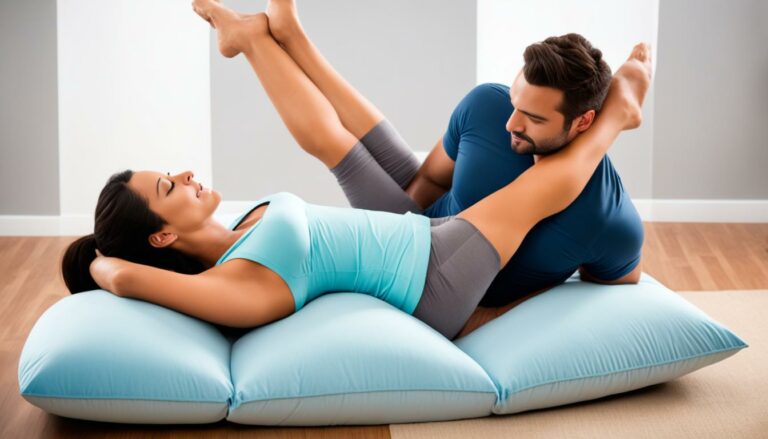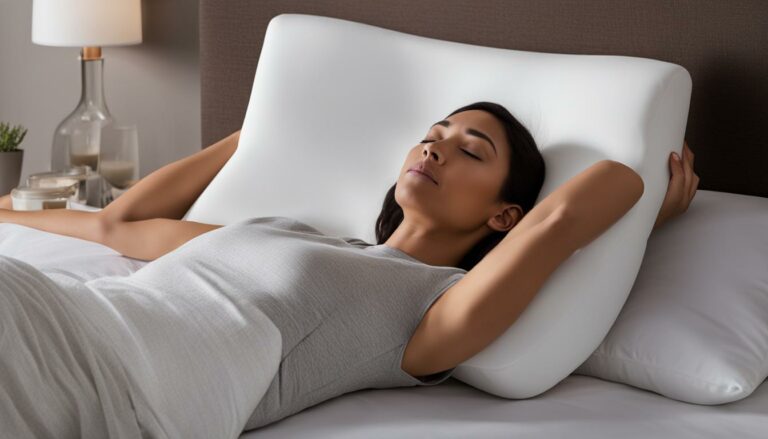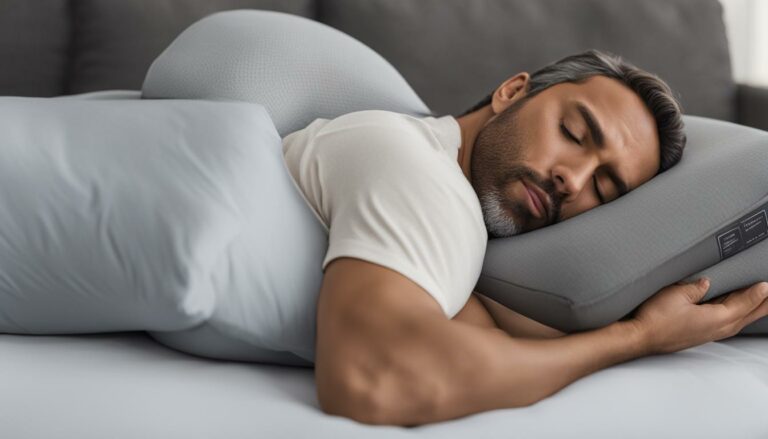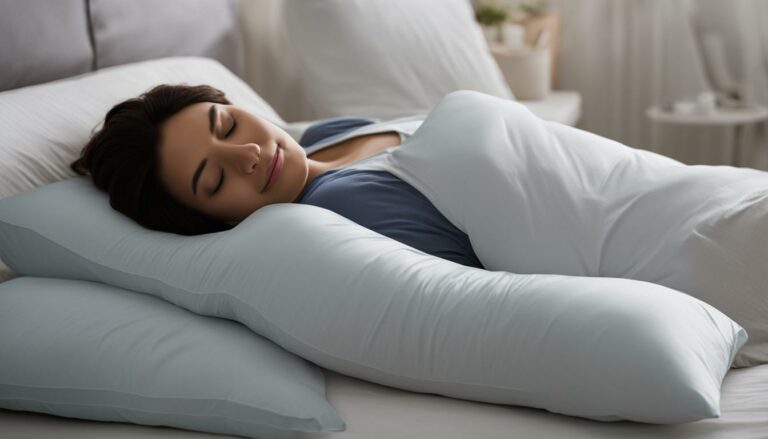Optimize Sleep with Body Pillow Sleeping Position
Eric Christie stands as a luminary in the bedding industry, with a career spanning nearly four decades since the early 1980s. His journey through the world of bedding has seen him wear many hats – a manufacturer, designer, and retailer, showcasing his versatility and expertise in Read more...
pillowsandbedsheets.com and its partners may earn a commission if you purchase a product through one of our links
Are you struggling to get a good night’s sleep? Do you wake up with neck and back pain or discomfort? The solution might be as simple as adjusting your sleeping position with a body pillow. Whether you’re a side sleeper, back sleeper, or stomach sleeper, a body pillow can provide the support and alignment your body needs for a restful sleep.
Sleeping with a body pillow involves placing it on the bed lengthwise and cradling it between your legs while on your side. This position ensures a healthy posture for your sacrum, hips, and spine, reducing the risk of neck aches, hip pain, and general soreness. Body pillows are designed to maintain proper alignment, relieve pressure on delicate areas, and stabilize the head, resulting in a more comfortable and rejuvenating sleep experience.
Using a body pillow offers a range of benefits. It can minimize tossing and turning, improve blood circulation, and promote relaxation, allowing you to wake up feeling refreshed and revitalized. If you’re pregnant, a body pillow can provide the extra support your body needs during this special time. Individuals with sleep apnea or poor blood circulation can also benefit greatly from using a body pillow for sleep.
When it comes to choosing the right body pillow for your sleeping position, there are several options available. U-shaped pillows are ideal for pregnancy, providing support to the entire body. J-shaped pillows are great for individuals with back pain, offering targeted relief. Casper’s Hug Body Pillow provides customizable comfort with its adjustable design.
Don’t let discomfort and pain disrupt your sleep any longer. Optimize your sleep with a body pillow sleeping position that suits your needs. Experience the difference it can make in your sleep quality and overall well-being.
Key Takeaways:
- Using a body pillow can optimize your sleep by providing proper support and alignment.
- Body pillows offer benefits such as maintaining proper alignment, relieving pressure on delicate areas, and reducing sleep apnea symptoms.
- Different sleeping positions with a body pillow include tucking it under the back for back sleepers and placing it between the legs for side sleepers.
- Choosing the right body pillow depends on personal preferences and needs, with options such as U-shaped and J-shaped pillows available.
- A body pillow is especially beneficial for pregnant women, individuals with sleep apnea or poor blood circulation, and those who experience body aches and stiffness upon waking up.
The Importance of Sleep Posture for Overall Well-Being
Sleep posture is not just about finding a comfortable position to rest in; it also has a significant impact on your overall well-being. Just like your sitting and standing posture, sleep posture plays a crucial role in maintaining a healthy body and preventing common issues such as back pain, neck pain, and compromised sleep quality.
Static posture refers to the position of your body during periods of inactivity, such as sleep, while dynamic posture refers to the posture during movement. It is essential to maintain proper sleep posture, which involves keeping the natural curvature of your spine, to achieve numerous benefits for your physical and mental health.
Achieving and maintaining good sleep posture can help prevent or alleviate back pain, reduce snoring, and improve the overall quality of your sleep. Factors like age, mental health, pregnancy, changes in weight, or existing pain can affect your sleep posture. Additionally, the sleep system you choose, including the mattress and support, can impact your posture during sleep.
Good sleep posture ensures proper spinal alignment, reducing the likelihood of waking up with pain and discomfort. Conversely, poor sleep posture can lead to neck and back pain, limited mobility, and a decrease in sleep quality.
To promote good sleep posture and alleviate discomfort, it is crucial to select a supportive mattress and pillow. These essential components should provide proper support to help maintain the natural alignment of your spine. By investing in a sleep system that supports proper sleep posture, you can enhance your overall well-being and wake up feeling refreshed.
Proper sleep posture is key to improving sleep quality and preventing common issues such as back pain and neck pain. By understanding the importance of sleep posture and investing in a supportive sleep system, you can experience more restful nights and wake up feeling rejuvenated.
Proper Pillow Position for Side Sleepers
As a side sleeper, finding the proper pillow position is essential for a good night’s sleep and optimal spinal alignment. Without the right support, you may experience discomfort and pain in your neck, back, and shoulders. By following these tips, you can ensure a comfortable and restful sleep:
- Place a pillow between your legs: This helps keep your spine aligned and prevents twisting forward, which can put pressure on your hips and back. The pillow fills the space between your legs, providing support and reducing strain.
- Fill the gap between your head and the mattress: A pillow that fills the gap between your head and the mattress is crucial in maintaining proper alignment with your spine. It should provide adequate support without lifting your shoulders too much.
- Consider using a body pillow: A body pillow can provide additional support and alleviate pressure on your shoulder, hip, and overall body. It allows for a more comfortable sleep position and helps distribute your weight more evenly.
Proper pillow positioning for side sleepers is crucial in promoting spinal alignment and reducing discomfort. By placing a pillow between your legs and ensuring the right support for your head, you can enjoy a more comfortable and restful sleep.
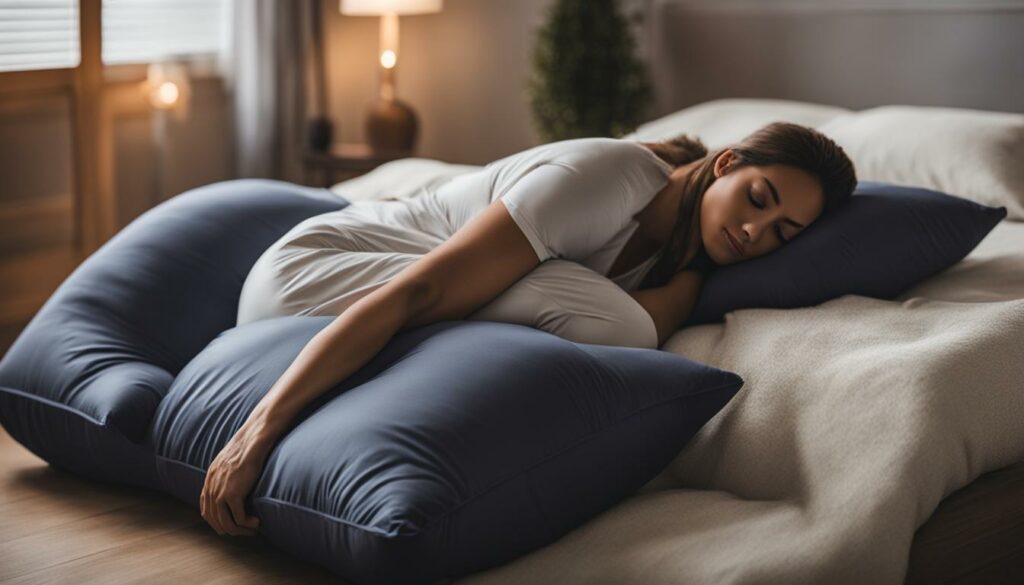
Remember, everyone’s body is different, so it’s important to find the pillow position that works best for you. Experiment with different pillow sizes and positions to discover what brings you the most comfort and support.
Proper Pillow Position for Back Sleepers
Back sleepers require the right pillow position to ensure proper support and alignment for a restful night’s sleep. When it comes to pillow thickness, it’s important to choose a thin pillow that doesn’t push the head too far forward, which can strain the neck.
To further promote good sleep posture for back sleepers, consider placing a small pillow under the knees. This helps support the natural curve of the spine and reduces the risk of discomfort or pain. Sleeping on the back with additional pillows or on an adjustable-base bed can also be beneficial for specific conditions such as heartburn or congestion.
Here is a table summarizing the proper pillow position for back sleepers:
| Pillow Position | Description |
|---|---|
| Head Pillow | A thin pillow to support the head without pushing it too far forward or tipping it back. |
| Leg Pillow | A small pillow placed under the knees to maintain the natural curve of the spine and promote proper alignment. |
By finding the right balance of pillow thickness and knee support, back sleepers can maintain proper alignment and enjoy a comfortable sleep experience.
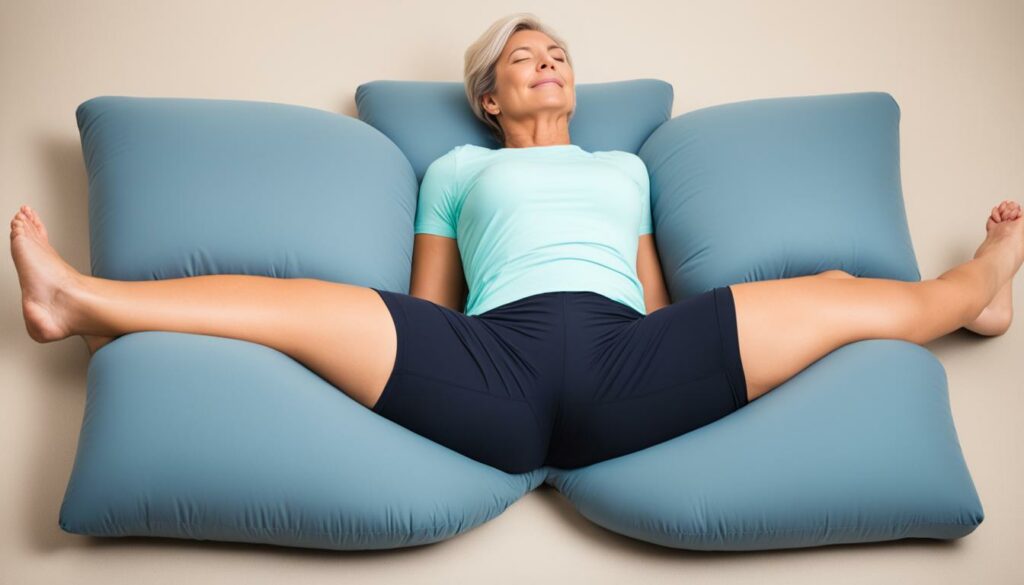
Proper Pillow Position for Stomach Sleepers
Stomach sleeping is a common position that many people find comfortable. However, it is important to note that sleeping on your stomach can put strain on your spine and cause pain and discomfort over time. While transitioning to a different sleep position, such as side or back sleeping, is generally recommended, there are a few ways to optimize your sleep posture if you prefer sleeping on your stomach.
When it comes to choosing the proper pillow position for stomach sleepers, there are a few key considerations. First, using a thin pillow or no pillow at all can help prevent excessive lifting of the head and neck, which can lead to unnatural alignment and potential strain. By allowing your head to rest closer to the mattress, you can reduce the pressure on your neck and spine.
Additionally, placing a flat pillow or a folded towel under your hips can help support the natural curve of your spine and minimize strain. This can help maintain better alignment and alleviate some of the stress on your lower back.
While these adjustments can help improve the sleeping posture for stomach sleepers, it is important to remember that transitioning to a different sleep position, such as side or back sleeping, is encouraged to avoid long-term negative effects on your posture and sleep quality.
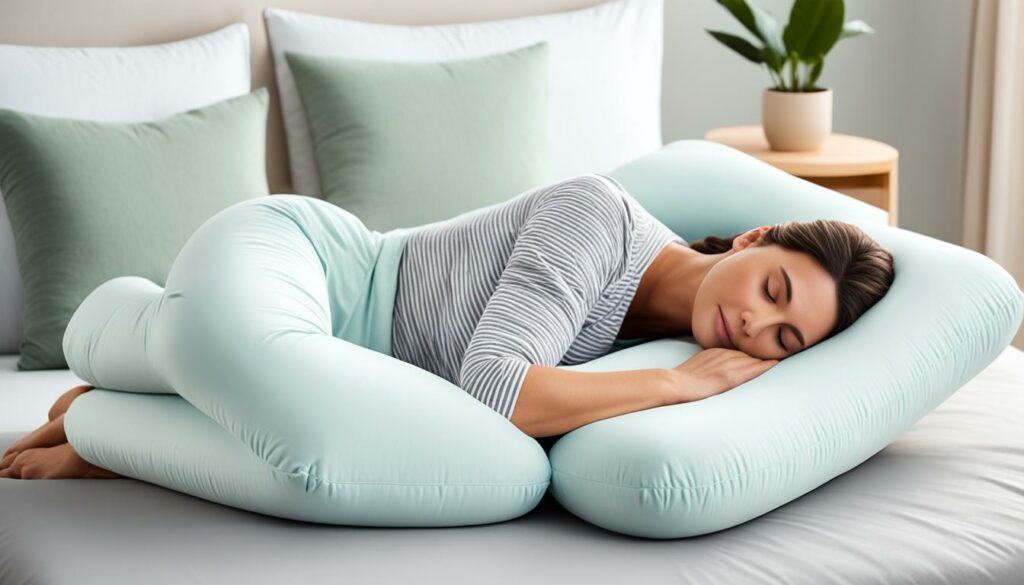
Comparison of Pillow Positions for Different Sleeping Positions
| Sleeping Position | Pillow Position |
|---|---|
| Stomach Sleeping | Thin pillow or no pillow |
| Side Sleeping | Pillow between legs |
| Back Sleeping | Thin pillow or small pillow under knees |
| Combination Sleeping | Pillow under head, pillow between legs or under knees |
Proper Pillow Position for Combination Sleepers
Combination sleepers, those who switch between different sleep positions throughout the night, need to ensure they maintain proper alignment and support for a restful sleep. To achieve this, the pillow position plays a crucial role.
When sleeping on your side as a combination sleeper, it’s important to use a pillow under your head to maintain alignment with your spine. This helps prevent neck strain and promotes better sleeping posture. A medium-thickness pillow is recommended to provide adequate support and comfort.
Additionally, it’s beneficial to keep an extra pillow nearby to place between your legs or under your knees when transitioning between sleeping positions. This helps maintain proper alignment of the spine and reduces the likelihood of discomfort or pressure points.
Combination sleepers can also consider using a body pillow, which can provide support and enhance comfort in various sleeping positions. A body pillow can be placed between the legs, under the knees, or hugged for additional support, depending on the desired sleeping position.
Benefits of Proper Pillow Position for Combination Sleepers:
- Ensures alignment and support in both side and back sleeping positions
- Reduces strain on the neck and promotes better sleeping posture
- Prevents discomfort and pressure points
- Enhances overall sleep quality and comfort
By adjusting the position of your pillows to accommodate your changing sleep positions throughout the night, you can maintain optimal alignment, alleviate discomfort, and promote a more restful sleep experience.
| Pillow Position | Key Benefits |
|---|---|
| Pillow under head |
|
| Pillow between legs or under knees |
|
The Best Sleep Position
The best sleep position varies depending on individual preferences and specific health considerations. There is no one-size-fits-all answer. Side sleeping and back sleeping are generally recommended for maintaining good posture and preventing pain and discomfort.
Side sleeping offers several benefits such as improved blood flow, reduced acid reflux, and alleviated snoring. By sleeping on your side, you can promote healthy spinal alignment and reduce the risk of developing wrinkles or acne.
Back sleeping, also known as the supine position, can help minimize the appearance of wrinkles and acne. Additionally, sleeping on your back allows for optimal spinal alignment, ensuring proper support for the head, neck, and back.
On the other hand, sleeping on the stomach is discouraged due to the strain it puts on the spine, potentially leading to pain and discomfort. However, if you prefer this sleep position, using proper pillow positioning can help minimize the strain and discomfort.

Ultimately, the best sleep position is the one that allows for proper spinal alignment and promotes a restful and comfortable sleep experience. It’s important to listen to your body, consider any specific health concerns, and choose a sleep position that works best for you.
Choosing the Right Mattress for Proper Sleep Posture
The right mattress is crucial for maintaining proper sleep posture and alleviating discomfort. When selecting a mattress, it’s important to consider factors such as support and firmness, as well as the overall sleep system.
A moderately firm mattress is recommended for optimal sleep posture. This type of mattress provides the right balance of support and comfort, keeping the head and neck aligned with the spine. It helps prevent unnecessary strain on the muscles and reduces the risk of waking up with pain and stiffness.
Aside from the mattress itself, the support system consisting of a box spring and bed frame also plays a significant role in promoting good posture during sleep. These elements contribute to the overall stability and alignment of the mattress, ensuring that it properly supports your body while you rest.
When choosing the right mattress for proper sleep posture, it’s essential to take into account individual needs and preferences. Factors such as age, weight, and health conditions can influence the type of mattress that is most suitable. Additionally, personal comfort should be a guiding factor in the decision-making process.
A supportive mattress that aligns with your specific needs can significantly improve sleep quality, reduce pain, and decrease overall stress. Investing in a high-quality mattress that provides proper support and allows for restful sleep is an investment in your well-being.
Here is a table summarizing key considerations when choosing a mattress for proper sleep posture:
| Considerations | Description |
|---|---|
| Support | Choose a mattress that offers adequate support to keep your spine aligned. |
| Firmness | A moderately firm mattress is generally recommended for proper sleep posture. |
| Comfort | Consider your personal comfort preferences when selecting a mattress. |
| Sleep System | Ensure your mattress is supported by a sturdy box spring and bed frame for optimal performance. |
| Individual Needs | Take into account factors such as age, weight, and health conditions when choosing a mattress. |
By choosing the right mattress and considering these important factors, you can create an ideal sleep environment that promotes proper sleep posture and helps alleviate discomfort.
Tips for Improving Sleep Posture
Improving your sleep posture is essential for promoting better sleep quality and overall well-being. Here are some tips to help you maintain proper alignment and prevent discomfort during sleep:
1. Practice exercises that strengthen your core muscles, including your abdominal and back muscles. Strong core muscles support your spine and contribute to better sleep posture.
2. Use supportive pillows to ensure spinal alignment. Consider using body pillows or memory foam pillows that provide proper support for your head and neck. These pillows can help keep your spine in a neutral position throughout the night.
3. Invest in supportive bedding, such as mattresses and adjustable bases. A supportive mattress that matches your specific needs and preferences can greatly contribute to maintaining good sleep posture.
By following these tips, you can improve your sleep posture, minimize pain and discomfort, and enjoy a more restful sleep. Remember, prioritizing proper sleep posture is key to enhancing your overall well-being.
FAQ
What are the benefits of using a body pillow for sleep?
Using a body pillow can help maintain proper alignment, relieve pressure on delicate areas, stabilize the head, reduce sleep apnea symptoms, minimize tossing and turning, improve blood circulation, and promote relaxation.
How do I choose the right body pillow for my sleeping position?
The right body pillow depends on personal preferences and needs. Options include U-shaped pillows for pregnancy, J-shaped pillows for back pain relief, and Casper’s Hug Body Pillow for customizable comfort. Fill options like down, foam, and down alternatives can also be considered.
Is using a body pillow beneficial for pregnant women?
Yes, using a body pillow can provide support for the growing belly, relieve pressure on the hips and back, and promote more comfortable sleep for pregnant women.
How does sleep posture impact overall well-being?
Sleep posture plays a crucial role in overall well-being. Maintaining proper sleep posture helps prevent or relieve back pain, reduces snoring, and improves sleep quality.
What is the recommended pillow position for side sleepers?
Side sleepers should use a pillow between their knees to keep the spine aligned and prevent pressure on the hips and back. Using a body pillow for side sleeping can also alleviate pressure on the shoulder, hip, and overall body.
What is the proper pillow position for back sleepers?
Back sleepers should use a pillow for their head to prevent excessive tipping back and straining the neck. Placing a small pillow under the knees can support the natural curve of the spine and promote good sleep posture.
How should stomach sleepers position their pillows?
Stomach sleepers are recommended to use a thin pillow or no pillow at all to prevent lifting the head and neck into an unnatural position. Placing a flat pillow under the hips can support the natural curve of the spine and minimize strain.
What pillow position is best for combination sleepers?
Combination sleepers should use a pillow under their head to maintain alignment with the spine in both side and back sleeping positions. Keeping another pillow nearby to place between the legs or under the knees when transitioning between positions can also help maintain proper alignment and increase overall comfort.
What is the best sleep position?
The best sleep position varies depending on individual preferences and specific health considerations. Side sleeping and back sleeping are generally recommended for maintaining good posture and preventing pain and discomfort. However, the best sleep position is the one that allows for proper spinal alignment and promotes a restful and comfortable sleep experience.
How do I choose the right mattress for proper sleep posture?
Choosing the right mattress is crucial for maintaining proper sleep posture. A moderately firm mattress that keeps the head and neck aligned with the spine is recommended. It is important to consider factors like age, weight, health conditions, and personal comfort when selecting a supportive mattress.
What are some tips for improving sleep posture?
Some tips for improving sleep posture include practicing exercises to strengthen core muscles, maintaining spinal alignment with supportive pillows, and investing in supportive bedding such as mattresses and adjustable bases.
Eric Christie stands as a luminary in the bedding industry, with a career spanning nearly four decades since the early 1980s. His journey through the world of bedding has seen him wear many hats – a manufacturer, designer, and retailer, showcasing his versatility and expertise in Read more...


